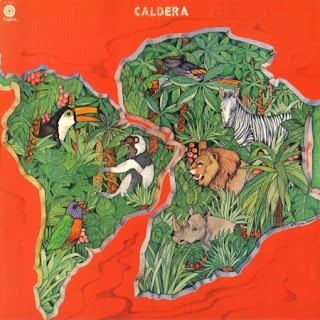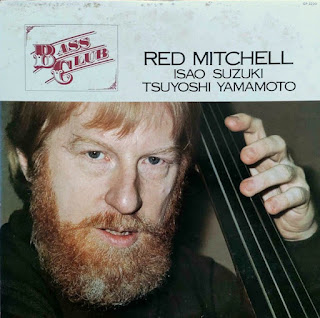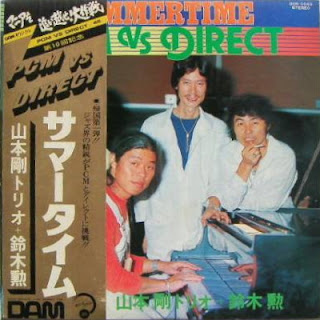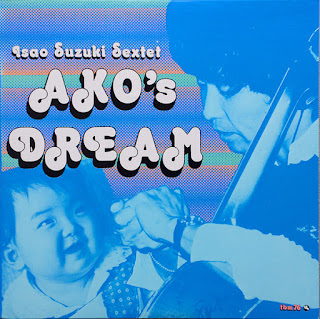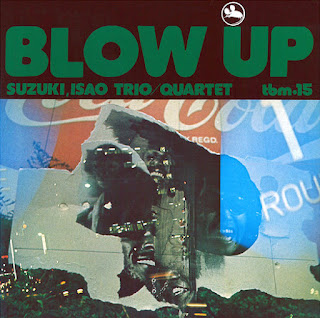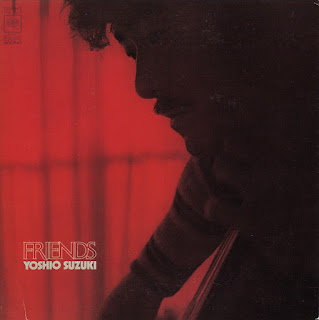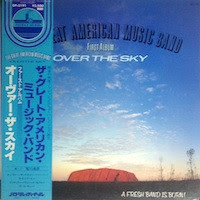Tuesday, January 30, 2024
Caldera
Wednesday, January 24, 2024
Isao Suzuki Part 6
This will be a slightly longer post because I'd like to wrap up our look into Isao Suzuki. We have a few from the 80s to look at and 1 from the 2000s. I'm going to keep it short and sweet for each release so we can keep it moving.
First up we have 1980's Bass Club, which is essentially a duo bass album with Red Mitchell. There is a piano presence on a couple of the tracks from Tsuyoshi Yamamoto. All standards here with my favorite being a nice rendition of "Yesterdays".
Another duo album is next for us, this time featuring pianist, Kunihiko Sugano. Sincerely Yours is also comprised of mostly standards. A relatively calm vibe throughout on this one and I find Sugano to be an excellent pianist. Favorites for me are "The Midnight Sun Will Never Set" and the closing tune, "Goodbye."
Next up for us we have Four Wings, also from 1980. Here we have the well traveled Hidehiko Matsumoto on saxophone and flute, Sugano again joins on piano and George Otsuka on drums. Mostly all standards here again, with the opening "Speak Low" as a personal favorite; a tune I always enjoy. The closing, title track from Otsuka is another highlight here.
We are into 1981 for our next release, Self-Portrait. A fully solo album featuring Isao on a variety of instruments plus adding some non-lyrical vocals. Definitely a bit of meandering here and possibly not an album for everyone. We do have some originals which is outside of the norm for this time period. I enjoyed "Loving Lash" and "Dialogue In My Self".
Also in 1981, Isao released Samba Club and while it is all covers/standards, at least we have some tempo to lively things up a bit. On keys we have both Ichiro Doi and Yamamoto, along with guitarist Takayuki Kato. On drums and harmonica we have American Donald Bailey and adding some percussion, we have Francis Mann. Nice version of "Tenderly" here, along with a nearly solo rendition of "Greensleeves" from Isao.
Next up, we have another 1981 release in Three Cushion. Here Isao is joined by guitarist, Yoshiaki Miyanoue, pianist Doi, saxophonist Akira Miyazawa, trombonist Tadanori Konakawa and drummer Motohiko Hino. I'll have a post for Motohiko soon. Pretty straight forward album of mostly covers with the exception being the title track. Favorite for me is the Teddy Edwards tune, "Together Again."
The last album from the 1980s I have is 1986's Approach. Quartet here with the fantastic pianist Hideo Ichikawa, Akira Shiomoto on guitar and Masahiko Togashi on drums and percussion. All originals from within the group with personal favorites being the Ichikawa tune "Otari" and Isao tune "Mysterious." Mostly straight forward album here to close out the decade.
We travel all the way to 2003 for our next, and final, release, Blow Up 2. My assumption is this must have been recorded over various sessions because we have quite a few players lending support. On keys we have Sugano, Yamamoto and Josei Sato. On drums we have Otsuka, Makoto Rikitake and Takayuki Koizumi and also along for the ride is guitarist, Takeshi Nagayama. A straight-ahead album here of mostly covers/standards again, but overall a pleasant album for the tail-end of a legendary career. I enjoyed the nice rendition of "What A Wonderful World."
Whew. So that's everything I have from legendary bassist, Isao Suzuki. If you're here I hope you've found at least a few albums to enjoy.
Tuesday, January 23, 2024
Isao Suzuki Part 5
Good afternoon. Back again today to continue our look at Isao Suzuki's catalog. We're nearing the end of what I have - so I'm going to try to wrap up over the next couple of days.
First for today we have a nice little album, albeit with limited information, in 1979's PCM vs Direct: Summertime. The reason for the title is due to one side being mastered by PCM and the other by Direct Cutting. This one was released as the Tsuyoshi Yamamoto Trio with Isao Suzuki. While I'm not 100% certain, I believe Shinji Mori is handling the drums here, with Yamamoto on piano and Isao on bass. Either way, 3 nice renditions of some standards here with the highlight being the title track, Summertime, from the legend George Gershwin.
Next up we have another release from 1979, duo album A Day Of The Sun with Masahiko Togashi. Both artists employ a variety of instruments on this experimental/free jazz album. Isao on his usual double bass, piccolo bass, cello, Solina synthesizer along with a variety of percussion instruments. Much of the same from Togashi, with his focus on drums, percussion and also synthesizer. I didn't make this page to be negative so I'll just say this one doesn't really do it for me. I've listened to it quite a few times but it's just a little to much meandering going on for me. Honorable mention for "Lonely Blue." Maybe someone here will feel differently.
The final release I have from the 1970s is The Thing, released in 1979 as Isao Suzuki & New Family. Supporting Isao here we have Masayoshi Yoneda on keys, Takayuki Kato on guitar, Shuji Miyake on trumpet and flugelhorn, and Shigeo Hirayama on drums. Really nice album here with my favorites being "For Miles" with it's nice muted trumpet and "Sunburn Samba" with it's great piano and trumpet play. No real misses here, however. Enjoyable through and through.
Also in 1980 and under the New Family name, we have Mongolian Chant featuring the great trombonist, Shigeharu Mukai and saxophonist, Toshiyuki Honda. Again we have Kato on guitar, Miyake on trumpet and flugelhorn, and Hirayama on drums. Also along for the ride are Ichiro Doi on keys and Motohiko Hamase on bass. Isao is here with his usual double bass, piccolo bass and also on Hammond organ. This isn't my favorite album but I do enjoy the opening, title track, along with "Joy."
The final album from the New Family is 1980's Bamboo Dance. A touch more accessible than the last few albums we've looked at, the same personnel is here as was on Mongolian Chant; sans Mukai and Honda. Looks like after the fantastic opening, title track, we have a few covers. Two of which I really enjoy in Legrand's standard "What Are You Doing With The Rest Of Your Life" and the Victor Young standard, "Stella By Starlight." I also thoroughly enjoy "Beat It Up."
Enjoy!!
Friday, January 19, 2024
Isao Suzuki Part 4
Thursday, January 18, 2024
Isao Suzuki Part 3
Hey folks, back again with another round of Isao Suzuki albums. We're starting to get into the material that I find the most enjoyable.
First up for today is Isao's only release as a sextet, 1976's Ako's Dream. Joining Isao and his cello, we have Watanabe again on guitar, along with guitarist Kazumasa Akiyama. We also have Motohiko Hamase on bass, Tsuyoshi Yamamoto on keys and Akira Doi on drums.
We start off with 2 originals, the first being the somewhat spacey title track, followed by the swinging "Isao Family." You'll need a dance partner for that one. Next up we have my favorite tune from the album, an excellent rendition of "Feel Like Making Love" and we close with Benny Goodman's "Seven Come Eleven." Excellent album through and through and one I revisit pretty frequently.
Missing here is 1976's Hip Dancin' so if anyone can help out with an assist, I'd be truly grateful.
On to 1977 we go with Cadillac Woman, again featuring Watanabe and Akiyama on guitar, Cedar Walton on keys, Sam Jones on bass with Billy Higgins on drums. Absolutely excellent groove on the opening, title track, but unfortunately none of the other tunes really moved me. We will revisit "Cadillac Woman" on our next post, as well.
Next up for us is an album technically from the Sunao Wada Quartet feat. Isao Suzuki in 1977's Blues Blues Blues. Obviously, Wada is here on guitar, Isao is on bass and cello, Tetsujiro Obara is on drums and we also have Masaru Imada on piano & organ. Despite blues tunes not being my favorite, this is a pretty stellar album. It's heavy on guitar, as expected, and Wada plays wonderfully. Imada shines throughout on the organ, another sound that isn't my favorite but works quite well with the overall blues theme of the album. All Wada originals here with the exception being the second to last track from Oscar Pettiford, "Blues In The Closet." Personal favorite for me is the closing tune, "A Good Deal Of The Blues."
The final album for today is 1978's String Band, which features a relatively large group of players, led by the brilliant Masahiko Satoh in a conductor/arrangement role. Isao employs the piccolo bass, with living legend Ron Carter on double bass, Tomio Yajima on cello, Tatsuya Takizawa on viola, with Masatsugu Shinozaki and Takashi Sato on violin. We have yet another legend in Hank Jones on piano, Takeshi Onodera lending some support on percussion and Roy Haynes on drums.
Obviously the presence of strings adds a new dynamic to the sound. The opening Horace Silver track, "Nica's Dream" is quite nice, along with a beautiful rendition of "Greensleeves." Honestly all 5 songs here are pretty nice. A unique album that is well worth the listen.
Hopefully I can get another round ready tomorrow. Until then, enjoy!
Wednesday, January 17, 2024
Isao Suzuki Part 2
Today we'll take a look at the next round of albums from Isao Suzuki.
First we have 1975's Orang-utan and there's a little bit of a discrepancy regarding personnel on discogs vs the liner notes of the album. I'm going to stick to the album notes. Isao is here of course on bass, cello and electric piano, Osamu Kawakami is on double bass, Kenji Mori is on sax, flute and bass clarinet, Kazumi Watanabe on guitar and Shinji Mori is on drums. Track 2 features Mari Nakamoto on vocals. We'll have more from her shortly.
Orang-utan opens with a nice blues track, "Blue Road" featuring Isao on electric piano. Next we have a rendition of the Shirley Horn tune, "Where Are You Going" featuring Mari Nakamoto, as mentioned. She has a wonderful voice but as I am not a huge fan of vocals, I've included an instrumental version, as well. It's not an overly advanced method but it works.
Next up is the standard, "My One And Only Love" with Isao playing the cello quite nicely. Kenji shines on the closing, title track, on bass clarinet. A sound I really dig. Overall a pretty groovy tune sounding more modern/fusion than most of the material thus far. Watanabe also ventures out further on guitar than we've heard to this point. He also has a massive catalog with a ton of stunning work worth checking.
Next we have a quite pleasant album that I enjoyed more than I anticipated. Mari Nakamoto III features Nakamoto on vocals throughout and she's accompanied by Isao on bass and Watanabe on guitar. The instrumentation is very calming and fitting to Mari's vocals. I've also included an instrumental copy of the album, tagged separately, for those interested. Favorite tune here for me is the closing, and classic, "A Nightingale Sang In Berkley Square."
Also in 1975, we have a personal favorite of mine in the album, Touch. Released as Isao Suzuki and His Fellows, we again have Watanbe on guitar, as well as guitarist Masayuki Ise. Kunihiko Sugano is here on piano, as well as Tetsujiro Obara on drums. Offering some additional percussion, we have conga player, Yoichi Ogawa. The opening, title track, pivots between fusion and a more traditional sound and is worth the price of admission alone. The only original tune on the album, it's followed by 3 covers and a return to a more straight forward sound, including the standard "She's Funny That Way" and Monk classic, "Round Midnight."
The following year, 1976, Isao released Black Orpheus. Wonderful trio album featuring Tsuyoshi Yamamoto on piano and the well-traveled American drummer, Donald Bailey. All standards here with the exception of the closing tune from Yamamoto, "Blues." Personal favorites are the opening, title track, as well as the rendition of "Who Can I Turn To." Isao shines on the cello and Yamamoto is solid throughout. Enjoy!
Tuesday, January 16, 2024
Isao Suzuki Part 1
Monday, January 15, 2024
Yoshio Suzuki
I couldn't begin to list all of the appearances Yoshio Suzuki has made over the years - but the Nagano-born bassist has a pair of albums, Friends and Matsuri, that we'll take a look at here. I believe the only appearance he has made on this page thus far is on Kohsuke Mine's 2nd Album.
First up, we have 1973's absolute gem of an album in Friends. We will quickly recognize the names of his supporting cast in saxophonist Kohsuke Mine, pianist Takehiro Honda, drummer Hiroshi Murakami, and making an appearance on "Samba de Chico" is flautist, Hideo Miyata. We have 5 tracks here and as far as I can tell, all are original compositions from Suzuki. Personal favorites are the opening, title track, along with "Burning Point" and "K's Waltz." This album mostly has a hard bop vibe and the playing from everyone is superb throughout.
Into the 80's, Suzuki began playing more ambient sounding music and after a quick visit, I decided to stick with the 2 albums here.
For the next few posts, I'll be working on sharing what I have from Isao Suzuki. We'll start with the first half of the 1970s.
Friday, January 12, 2024
Arakawa Band
Apparently I listened to 1,018 different artists in 2023. Nearly all jazz in one shape or form. Some were artists I was already familiar with but I'd bet the majority were new to me. A favorite of mine I stumbled upon is what I'll cover today. Arakawa Band, lead by flautist and saxophonist Tatsuhiko Arakawa, absolutely blew me away when I listened to their limited catalog.
Turns out, the group released two albums under the name The Great American Music Band before changing their name. Both albums were released in 1979 and I'm not 100% certain which album was released first. Based on sound alone, my guess is Over The Sky was the first release. It's a little more straight ahead and less funky than the remaining material which leads me to believe it was the group's debut. Quite the ensemble here:
Saxophone, flute, clarinet: Tatsuhiko Arakawa
Saxophone, flute: Yasumasa Kikuchi
Trombone: Osamu Shiomura
Trumpet, Flugelhorn: Hitoshi Okano, Kenji Nakazawa, Toshio Araki
Keyboards: Ryozo Henmi, Tohru Miyahara, Kenji Sato
Electric guitar: Teiji Mihata
Electric bass: Koh Tsubota
Percussion: Eiji Narushima
Drums: Tsugio Ano
I can't find detailed notes on the album but we have 5 tracks here with personal favorites being "Sound Inn" and "A Lasamba". Tight instrumentation throughout. Arakawa's compositions and arrangements are bar none. I revisit this album the least and it's still a rock solid release. "A Lasamba" picks up the tempo and leads right into Scorpio quite well.
Scor'pio comes in with a runtime of about 26 minutes and honestly I love every second of it. The opening tune (from Michael Brecker) "Night Flight" is the longest of the bunch at 7 minutes and sets the tone for the rest of the record. I could change my personal favorite after each listen but the opening track, the title track and the closing track, "Dream of Paradise" are all excellent. Again, tight instrumentation and stellar arrangements from Arakawa. Not a ton of drawn out improvisation, but rather quick hitting, uptempo tracks. This music is just flat out fun, in my opinion. Another sizeable ensemble:
Saxophone, flute: Tatsuhiko Arakawa, Shoji Maeda
Trombone: Osamu Shiomura
Trumpet: Hitoshi Okano, Toshio Araki
Keyboards: Akihiro Miyaura, Kenji Sato, Yoshikazu Miyauchi
Electric guitar: Chuji Nagaoka, Teiji Mihata
Electric bass: Koh Tsubota
Percussion: Noboru Kimura
Drums: Shigeru Inoue
Next up, we have 1980's album with John Kaizan Neptune, Bamboo. Neptune is a renowned player of the shakuhachi, which is a Japanese bamboo flute. An American based in Japan, he has quite an extensive catalog, although this album is my only exposure to his music thus far. JKN fits in quite nicely with the group, although technically I believe this is his album featuring Arakawa Band. I also cannot find specific details regarding personnel.
The final release in the catalog is 1981's Hard Boiled featuring trumpeter Hitoshi Okano. With Okano being a mainstay in the group, I'm not sure why the featuring tag was added to the title. Perhaps he had a larger hand in the compositions, I'm not entirely sure. The album starts off with a fantastic tune "Shadow" and also features a couple excellent, slower tracks in "Ebb and Flow" and "In The Mellow." Personal favorite is the funky "Kick Down". Again, it appears that the personnel is essentially the same, although it looks like they may have used a few different percussionists. Another fantastic album to close out the catalog.
